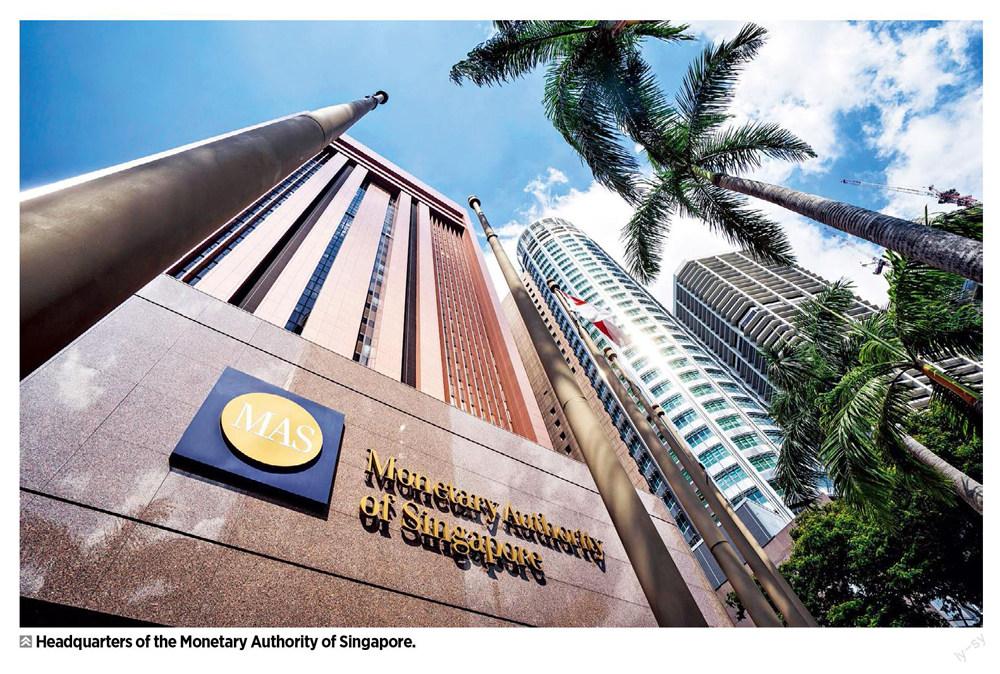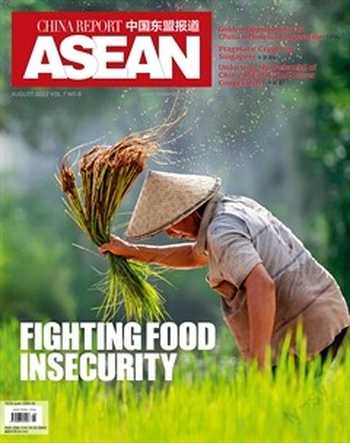Pragmatic Crypto in Singapore
Xiao Xin



The crypto-leading city-stateof Singapore remains firmlypositioned as a digital asset hub even after the distressing fallout in the cryptocurrency worldover the past few months.
But global media has beenincreasingly noticing theregulatory tightening in the Asian crypto epicenter as a pragmatic approach tobuilding a tokenized republic.
Toughening rhetoric may havesmashed some Singaporean cryptodreams, but the citys retailers have been overwhelmingly grateful.
Broadening Crypto Purview
In a fresh sign ofgrowing publicwariness with crypto, Ravi Menon,managing director of the MonetaryAuthority of Singapore (MAS), thecentral bank, signaled a move to broadenSingapores crypto purview while releasing the MAS annual report onJuly 19.
“The focus of crypto regulation to-date in Singapore, as well as in mostmajor jurisdictions, has been oncontaining money laundering andterrorist financing risks,”according to a transcript of his remarks published on the MAS website.
Still absent in most regulatoryregimes, according to Menon, are“consumer protection, market conduct, and reserve backing for stablecoins,” among other areas.
Regulatory strengthening isunderway in these areas. MAS willbe seeking“to consult on proposedmeasures in the next few months.”
The tightening was no surprise in the wake of a crypto tsunami that resultedin snowballing market evaporation.Many cryptocurrency outfits have beenpushed to the brink of bankruptcy.
As ofJuly 19, market capitalization of Bitcoin totaled US$446.69 billion, roughly one-third of its market caplogged in November when Bitcoinscaled to an all-time high of slightlyshort of US$69,000, according toCoinMarketCap, a price-tracking website for crypto assets.
The plunge shed nearly 70 percentof the value of the best-knowncryptocurrency, mirroring industry-wide decimation.
The gruesome tumble sinceNovember has been mostly in lockstepwith a downtrend in the tech-heavyNASDAQ exchange amid U.S.-ledmonetary tightening. NASDAQ closedat 11,713.15 points on July 19, down more than 27 percent from its all-time high of 16,212.23 on November 22.
The stinging inflation prompteddrastic tightening at the Federal Reserve, which began tapering the monthly paceof its asset purchases in November.
In addition to a faster pace oftapering, the U.S. central bank hasannounced four rate hikes so far thisyear. Most recently, the Fed opted to liftthe federal funds rate by 75 basis points(bps) in July, the first time that the Fedhas hiked rates by 75 bps twice in a row. Two previous hikes werea 50 bps decision in May and a 25 bps increase in March.
Some have theorized thatBitcoin, with a hard cap of 21million coins, should be ableto function as a hedge againstinflation. But all the data so farpaints cryptocurrency as a highly risky asset thats easily vulnerable to inflation.
The crypto meltdown becameeven more alarming for globalfinancial watchdogs fearing wider market collapse in May, whenthe TerraUSDstablecoin failed tomaintain its intended peg to theU.S. dollar.
Terras collapse broughtmany eyes to Singapore, where Terraform Labs and its affiliate Luna Foundation Guard, theentities behind TerraUSD, areincorporated.
The algorithmic stablecoinwas theoretically pegged one-to-one against the dollar, butthe stablecoin built on the Terra blockchain collapsed and hasremained de-pegged from thedollar since May 9.
The failure of TerraUSD andits paired token Luna resultedin hefty losses for Three ArrowsCapital, a fund manager firmregistered in Singapore that hasmajor holdings in the crypto space spanning Bitcoin and Luna. Three Arrows has filed for cessation inSingapore, pending regulatorysubmission, according to a noticeon the MAS website.
Embattled crypto lender Vauld, reportedly in merger talks afterhalting withdrawals, trading, and deposits in early July, is also based in Singapore.
In a matter of months, thesame factors that launchedSingapore to the forefront of the crypto world now appear to bepinning the country on its back feet.
But the crypto avant-garde,famed for its licensing andregulatory framework, was by no means caught off guard by thegrisly selloff.
During his remarks onJuly 19,Menon drew a line of demarcationbetween crypto firms widelyknown as Singapore-based andthose licensed or regulated by MAS.
TerraForm Labs and LunaFoundation Guard have nothingto do with the city-states crypto- related regulation. They haventapplied for any licensing or filedfor exemptions from holding any license.
Three Arrows had been up andrunning under the registered fund management mechanism buthad ceased to manage funds inthe country before the problemsleading to its insolvency.
The fund management firmwas not regulated under thePayment Services Act, legislationpassed in January 2019 to bringcrypto dealing and exchangeservices under MAS purview. The Act, which came into effect inJanuary 2020, was designed toenable crypto businesses fromanywhere in the world to applyfor a license to be listed on MAS regulatory roster.
Vauld did submit a licenseapplication which remains under review.
Out of almost 200 firmsseeking licensing in Singapore, only 14 have purportedly been approved for such licenses.
The harsh vetting process has smashed the dreams of somecrypto celebrities who had placed big bets on Singapore.
A representative figure was1,500Zhao Changpeng, a Chinese-Canadian business executive who founded Binance, the worlds topcryptocurrency exchange in terms of trading volume.
In August 2021, 45-year-oldZhao was ranked 22nd on Forbes Singapore 50 Richest 2021 list. Hewas ranked fifth on ForbesCrypto Rich 2021 list.
Not long after, Binance wasflagged by MAS as a memberof the Investor Alert List. Theaddition of Binance to the listof unregulated entities in earlySeptember served as a warning to investors who may have wrongly considered such entities asMAS-licensed or regulated andprecluded Binances tumble inSingapore.
In mid-December, BinanceAsia Services, the firms Singapore affiliate, revealed that itsapplication to run a regulatedexchange in Singapore had beenrevoked, essentially ending itsdrive since 2020 to win approvalin Singapore.
Its trading platformBinance.sg was scheduled to wind down operations andclose by mid-February.
The decision was arguably amonumental setback for Binance. The company had hinged majorhope on a settlement in Singapore after failing to gain accreditationfrom financial authorities incountries such as Japan, the UK,and Canada.
Zhao resided in Singaporebefore his crypto exchange largely relocated to Dubai in recentmonths.
The kick in the teethhas apparently prompteda recalibrated approach tomapping out a tokenized futurein Singapore, especially afterMASfresh avowal of broadening regulation to insulate Singapores crypto leadership vision fromhighly volatile and speculativeinvestment.
Striking Balance
While Singapore has stayedahead of the curve in buildingblockchain and cryptocurrencyprowess, especially in Asia, it has largely been on the alert to fixloopholes in the newly regulated area.
In a sign of the countrys fastrise to prominence in the cryptosphere, Singapore posted recordlevels of crypto and blockchaininvestment with 82 dealsamounting to US$1.48 billionin transactions last year, morethan 10 times the 2020 number: US$109.75 million over 26 deals,KPMG disclosed in a widely-cited February report.
In another ranking, 6 percent of crypto hedge fund managers were located in Singapore, a global third place shared with Chinas HongKong and Switzerland, accordingto an annual PwC report on global crypto hedge funds.
The U.S. topped the rankingwith 30 percent while the UK was second with 10 percent, per thereport.
Such figures evidently speak volumes about the allure ofSingapore as a crypto-favoring destination.
In contrast to the city-statesprimarily open and welcomingposture, other major jurisdictions in Asia have been moreconservative about crypto-backed trading.
Bitcoin mining and thefacilitation of crypto asset trading were entirely banned on theChinese mainland in the secondhalf of 2021 after cryptocurrencytransactions were barred in thefirst half.
In India, a bill wasintroduced that would prohibitcryptocurrencies from beingtapped as a method of payment in addition to related activities.
The availability of a vetting regime, albeit very discerningin its selection of eligiblecandidates, has remainedsufficient for Singapore tocontinue its wary expansion of offerings for crypto businesses aspiring for a foothold in theAsian promised land.
“In Singapore and in MAS, we are excited about the potentialto build a crypto or tokenizedeconomy,”said MAS chief Menonwhile addressing an IMF seminar on Money at a Crossroads in April.
That said, the Singaporeancentral bank will continue to hone its regulations to focus on majorrisks, according to Menon.
Understandably, threemonths later, Menon weighted his remarks more toward therisk side, factoring in the Maystablecoin collapse.
Investing in cryptocurrencies is highly risky, which is the keylesson Menon has recapped from the upheaval.
“This is what MAS has been warning the public about forthe past five years,”he insisted, citing the financial watchdogsrepeated admonitionsagainst retail investment incryptocurrency.
With an open but sobermind, Singapore, an avowedpractitioner of pragmatism, isstubbornly continuing efforts tostrike the right balance betweeninnovation-friendliness and risk- watchfulness. Such concerns have reverberated resoundingly acrossregulators worldwide fearful ofcrypto risk spilling over into thewider financial system.
While crypto businessesalways want regulatory easingand the media continues carefully scanning for tweaks to regulatory positioning, financial regulatorslike MAS are calculating theoptimal formulas to fit local path charting.
At a seminar scheduled forAugust to detail its position oncryptocurrencies, stablecoins,and other crypto assets, MAS“will set out how our developmentaland regulatory approaches willwork in harmony to achievethe vision of Singapore as aninnovative and responsible digital asset hub,”according to the MASchief, illustrating a risk-adjustedapproach to the contentious newera of opportunity.

